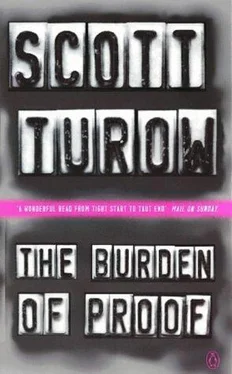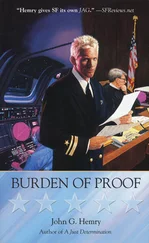Scott Turow - The Burden of Proof
Здесь есть возможность читать онлайн «Scott Turow - The Burden of Proof» весь текст электронной книги совершенно бесплатно (целиком полную версию без сокращений). В некоторых случаях можно слушать аудио, скачать через торрент в формате fb2 и присутствует краткое содержание. Жанр: Детектив, на английском языке. Описание произведения, (предисловие) а так же отзывы посетителей доступны на портале библиотеки ЛибКат.
- Название:The Burden of Proof
- Автор:
- Жанр:
- Год:неизвестен
- ISBN:нет данных
- Рейтинг книги:3 / 5. Голосов: 1
-
Избранное:Добавить в избранное
- Отзывы:
-
Ваша оценка:
- 60
- 1
- 2
- 3
- 4
- 5
The Burden of Proof: краткое содержание, описание и аннотация
Предлагаем к чтению аннотацию, описание, краткое содержание или предисловие (зависит от того, что написал сам автор книги «The Burden of Proof»). Если вы не нашли необходимую информацию о книге — напишите в комментариях, мы постараемся отыскать её.
The Burden of Proof — читать онлайн бесплатно полную книгу (весь текст) целиком
Ниже представлен текст книги, разбитый по страницам. Система сохранения места последней прочитанной страницы, позволяет с удобством читать онлайн бесплатно книгу «The Burden of Proof», без необходимости каждый раз заново искать на чём Вы остановились. Поставьте закладку, и сможете в любой момент перейти на страницу, на которой закончили чтение.
Интервал:
Закладка:
Thus, even days later, Radczyk's news remained unfathomable. It went, somehow, beyond right and wrong. The idea of a fifty-eight-year-old woman,-this fifty-eightyear-old woman, on the eve of grandmaternity-with a sexually transmiRed disease was as horrifying as some freak-show grotesque. Would the antecedent practices erupt only in late middle age? Perhaps he had spent a married lifetime playing the fool. He refused to believe it. It was like the concept of a fourth or fifth dimension. Beyond the capacities of an ordinary mind-or at least of his. Call it machismo or personal limitation, he could not envision his wife, as she clearly had been, with another man.
And it was for this reason that she had done what she had.
In his ravaged state of the last few days-amid the torment, the anger, the reviling and utter disbelief-that fact had not been lost. Her intent had been to spare him.
This was not sentimentality or self-delusion. After all the calculations, the conclusion remained the same. There was a lapse here, a monumental breach of faith which in life, perhaps, she might never have lived to see him forgive. She had saved herself great pain as well. But in the end her kindness, her fundamental kindness, remained her lodestar, her guiding light.
Oh, Clara! On the chair, With his sleeve rolled and his bled ann still vaguely atingle, Stern teetered for an instant on the verge of tears.
With that, his life, what was left of it, the many small illusions, would disappear.
Peter would have to be told, or might even guess. He saw that and, in the sluices of powerful remorse, for a moment did not care. Then his pride, with the grinding precision of a huge laboring machine, engaged once more and brought him fully about. He rolled down his sleeve over the gauze Peter had taped inside his elbow.
"And if this illness were to appear," Stern asked, "there is no treatment?"
"There' a drug called acyclovir. Ointment or pills. It's very successful in reducing the active period, and in many people it even prevents recurrence. Generally, the disease retreats into the nerve ganglia and waits to rear its ugly little head. Sometimes it never does. Sometimes it returns every few months, in ever-weakening episodes. That's the usual course. But there are all kinds of extraordinary clinical histories. Acute cases. Florid recurrences years apart. The most,difficult part of it is prodromal-you're in a contagious phase for a day or two before the visual signs appear, and short of a culture, you can never be completely certain that you won't infect someone else. It can mess up your life pretty well. In addition to being extremely uncomfortable."
"Yes," said Stern. His mind remained on Clara. All told, the weight of events seemed again to have settled on him with all their dead-star density. The facts, the facts. He had always placed his faith in particulars. Well, now he had them, lots of them. Many facts and, he supposed, certain inevitable conclusions.
He stood up and, without allowing time for reaction, touched his son's smooth face. "You are a good doctor, Peter. I appreciate your concem.
' '
Wise and sad, Peter nodded. His eyes did not leave his father. His son seemed to have a gift, a sense for the human nuance, the pathos that trailed along with each disease, mortality's dismal gossamer.Stern was pleased to find him so worldly. In their relationship, there was rarely anything subtle.
"Look, I'm sure you're okay," Peter said. "We'll just watch it. All right?"
"Very good," said Stern. He tossed on his suit coat. "I am grateful.
And sorry, Peter, to have involved you in such a disagreeable business."
"Oh, hell," said Peter. "You know what they say."
"What is that?" asked Stern. He was at the door.
"Life is full of surprises." His son was smiling. No doubt, he was thinking already about telling his sisters.
DIXON, predictably, enjoyed competition and for years had utilized every excuse to lure Stern into joining him in various sports. As Stern was apt to say, a business meeting with Dixon generally meant he would sweat. When Stern was younger, and considerably thinner, they had played handball at Dixon's downtown club. Stern was more nimble than his appearance might suggest, but he was no match for his brother-in-law. Larger, stronger, and far more athletic, Dixon never seemed to tire of winning. In season, he would bring Stern out on Lake Fowler to fish. Stern would foul his line and cast into the hushes and lily pads; back on shore, Dixon would describe Stern's ineptness to everyone they met. 'The only man who ever went fishing and nearly took a bird. I kid you not. Cardinal up in a tree? Stern missed hooking him by inches." Stern often told Clara that he was the trophy Dixon wanted stuffed and mounted.
By now, Stern had limited this rivalry to golf. Stern had more feel for this game; he was better on land than sea.
But, as usual, he did not play often enough to offer any serious competition for Dixon, who was virtually a scratch golfer. Dixon was a daring trouble player; he loved the shots where he had to rest one foot in the crotch of a tree or fade the ball around a light pole, and he was particularly reckless here on his home course. The Greenwood Country Club was cut a century before into these rolling hills, nearly forty miles from the city. This was horse country, with hills deep in elm and oak, poplar and pine. Easton University was no more than ten minues away.
Here, with Lake Fowler, the well-to-do breathed cooler air and pretended that the city that kept them rich was nowhere near. Dixon adored this life, like every other badge of status, and had his principal home nearby, a huge stone house which sat on twenty acres on the lakeshore.
They played from an elecc cart, accompanied by a forecaddy.
Dixon usually had one or two favorites, high-school-age boys, hardscrabble types with whom Dixon could josh about their sex lives, offering them his golfing theories after each successful shot. DiXon treated these boys kindly and tipped them shamefully well. Today they were accompanied by a'young man named Ralph Peters, a black kid who lived in DuSable and traveled nearly an hour and a half by train to reach the Greenwood Club on the weekends. Next year, Dixon was going to get a golf scholarship for Ralph, who was the caddy champion. With Dixon, this was not just talk. If need be, he would endow the scholarship himself. But he would also expect a chorus of appreciation and various acts of reverence befitting a beneficent king.
Stern waited until the third tee to talk about the investigation.
"I visited with Margy."
"So I heard," said Dixon. He was practicing his swing, but Stern thought he detected something whimsical in Dixon's expression. On the other hand, he could not doubt Margy's discrefon.
This hole, like most at Greenwood, was short and narrow, a little dogleg cut into the woods, about 330 yards. The green was set to the right of the fairway, so that the hole, sketched on the back of the scorecard, looked like a lowercase p. Dixon waggled his driver mightily over the ball, then pulled his shot deeply into the trees.
"Shit. Well, Ralph will find it. There." He pointed the driver toward the hollow below where Ralph.had emerged from the woods to indicate that the ball had been located.
Stern took the ground on his drive, but the ball hopped down the fairway. With the angle, Dixon would be away. He floored the cart and they zoomed down the hill together.
Stern, wearing a tam, held it and yelled a bit over the wind.
"I looked at the records the government wanted, before turning them over. And I also examined what I presume the agents assembled at Datatech."
"And?"
"And I am concerned."
Dixon glanced back, very briefly. He drove the cart up to Ralph.
"Right there, Mr. Hartnell. You better punch out." Dixon tromped in and out of the bushes. Stern could not see the lie, but had no urge to follow. He'd seen it before: Dixon making faces, muttering, conferring with Ralph with the gravity of a general.
Читать дальшеИнтервал:
Закладка:
Похожие книги на «The Burden of Proof»
Представляем Вашему вниманию похожие книги на «The Burden of Proof» списком для выбора. Мы отобрали схожую по названию и смыслу литературу в надежде предоставить читателям больше вариантов отыскать новые, интересные, ещё непрочитанные произведения.
Обсуждение, отзывы о книге «The Burden of Proof» и просто собственные мнения читателей. Оставьте ваши комментарии, напишите, что Вы думаете о произведении, его смысле или главных героях. Укажите что конкретно понравилось, а что нет, и почему Вы так считаете.












